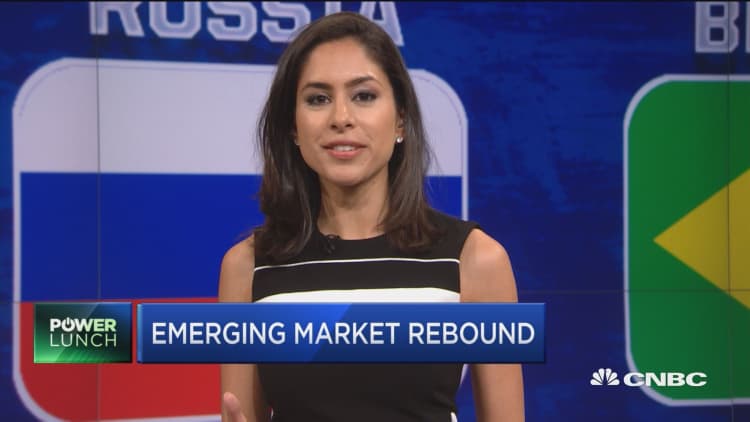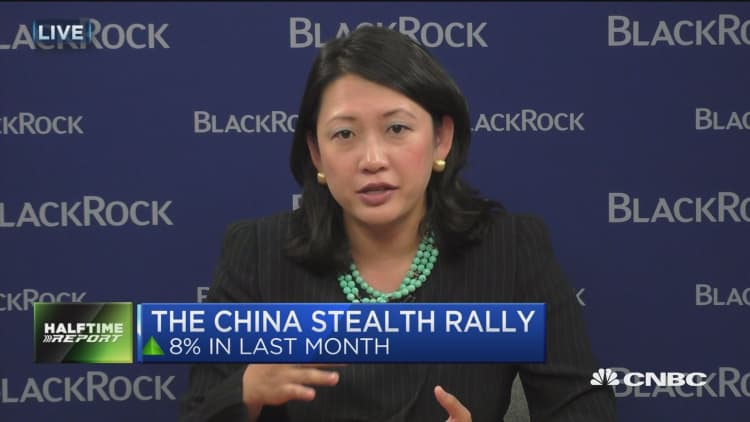While many investors have shunned emerging markets for their volatility, the post-Brexit world has made them suddenly much more attractive.
Some fund managers have low exposure to emerging markets, having pulled out of and stayed out, as concerns about a sharp slowdown in Chinese economic growth weighed on the outlook.
After the U.K. vote to leave the EU put European growth in question, a global flight-to-quality trade has helped send the to all-time highs and long-end U.S. Treasury yields to .
Now, many analysts are concerned about how much further those gains in U.S. assets can go. If the Federal Reserve remains on hold and the dollar stays steady, several strategists see opportunity in diversifying to emerging markets where growth forecasts remain higher than those for developed markets.
"Having exposure to emerging markets is now part of having a balanced portfolio," BlackRock's global chief investment strategist, Richard Turnill, said Tuesday at the BlackRock Investment Institute's roundtable on the midyear global investment outlook.
The asset manager's report highlighted "growing" conviction on emerging market equities as "currencies and trade balances have adjusted, and we see less risk of a sharp U.S. dollar rise."



Meanwhile, emerging markets, from Latin America to Southeast Asia, stand out in an environment of low global growth.
The World Bank expects emerging markets and developing economies to grow at a 3.5 percent rate this year, while advanced economies should see just a 1.7 percent rate, according to a June report.
"International exposure offers increased diversification that can help buffer your portfolio against market downturns," Jeffrey Kleintop, chief global investment strategist at Charles Schwab, said in a note Monday. He said generally allocating between a quarter to one half of stock holdings to international equities could benefit a portfolio.
Source: Charles Schwab
UBS this week raised its target for the key MSCI Emerging Market Index, and is now expecting a 4 to 5 percent gain in the second half of the year, or 10 percent for the entire year. Geoffrey Dennis, head of global emerging market strategy at UBS, does not believe EM equities will see the "sell in May and go away" scenario of last summer, now that the Fed is on hold after the Brexit vote.
Investors have been nervous about jumping into emerging markets, especially after China's surprise yuan devaluation sent global markets reeling last August. As a result, the iShares MSCI Emerging Market ETF (EEM) dropped 17 percent in the third quarter of last year, its worst three-month period in four years. EEM lost 18 percent in 2015 while the S&P was less than 1 percent lower.
In contrast, investors who stayed out of emerging markets so far this year have missed out on an opportunity to outperform U.S. stocks.
EEM is up 9.5 percent for the year so far, while the has risen more than 5 percent. The key is, the S&P closed at a record Wednesday, while EEM is about 9 percent below its 52-week intraday high.
BlackRock is neutral on emerging market equities for the third quarter, which Turnill said is actually a significantly positive outlook given that most of the firm's clients have been underweight.
Data from EPFR Global showed that since July 1, 2015, the majority of weekly emerging market equity flows have been negative. A period of dovish Fed commentary at the end of the first quarter temporarily supported inflows. That faded as U.S. central bank policymakers began talking up the possibility of a rate hike in June or July, until the disappointing May jobs report and the Brexit shock pushed expectations back.
Source: EPFR Global
A Fed on hold has generally kept the U.S. dollar index in a range and helped prevent competitive devaluation among emerging markets.
To be sure, significant strength in the dollar would pressure emerging markets again, but BlackRock and UBS don't see a dollar rise as part of their base case.
"A weaker U.S. dollar in the past has often coincided with strong performance in EM equities," BlackRock's report said. "Brexit uncertainty has led to a resumption in dollar strength, but we see this as contained and posing little threat to the EM world."
Lack of dollar strength has helped China keep the pace of its yuan depreciation gradual, while relative stability in Chinese data has alleviated concerns of a sharp economic slowdown.
In April, Bank of America Merrill Lynch reversed a five-year negative view with a "structurally bullish" outlook on emerging markets, partly based on its view of stabilization in China.
Turnill said BlackRock wouldn't turn bullish on emerging markets until more evidence of substantial structural reform in areas such as Brazil, India and China. But he noted hope that restructuring would occur and that he was watching for China's "fiscal policy to support consumer spending, not investment spending."
Nearly two-thirds of the global middle class is expected to be in Asia by 2030, according to analysis cited by the World Bank, which expects China to grow at a 6.7 percent rate this year.
"The next investing megatrend," Schwab's Kleintop said, "may be the adoption of middle-class lifestyles on a global scale with huge implications for global providers of goods and services."
China is scheduled to report retail sales, fixed-asset investment and industrial output on Friday. Second-quarter GDP is also due for release and economists polled by Reuters expect it to cool to a new seven-year low of 6.6 percent.


